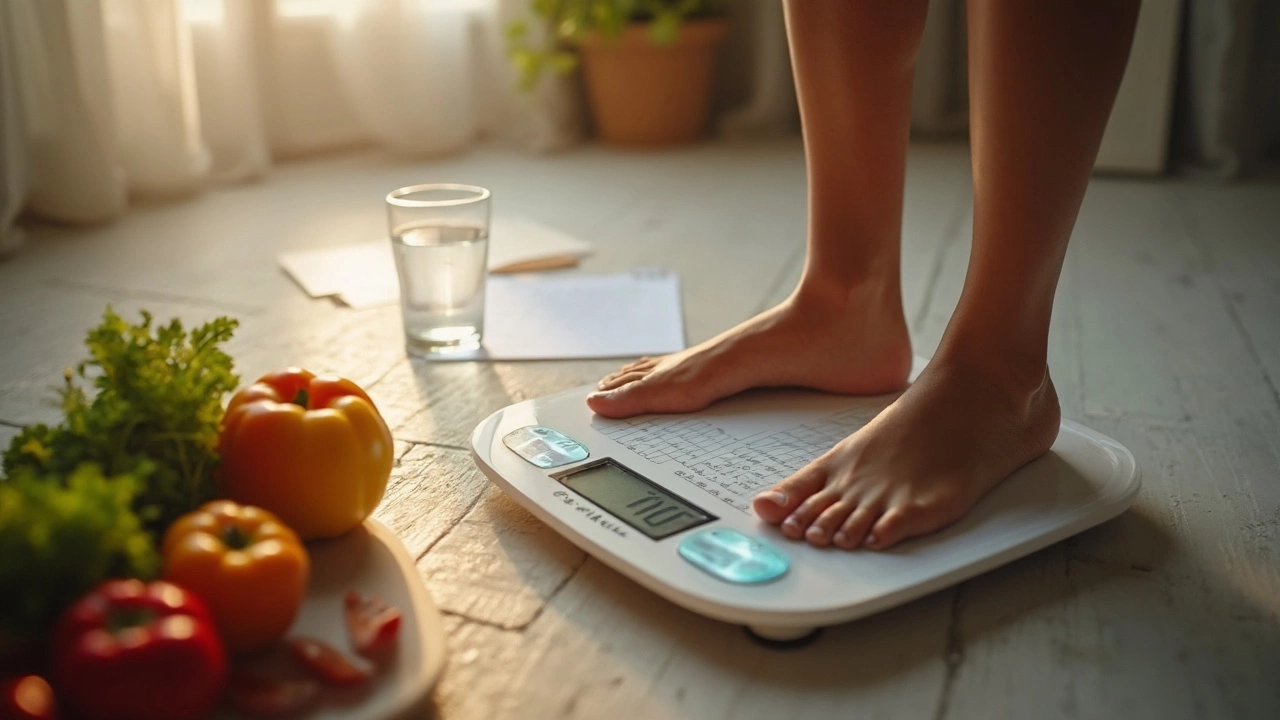- Home
- Health And Wellness
- How Much Weight Do You Need to Lose to Reverse Type 2 Diabetes Fast?

How Much Weight Do You Need to Lose to Reverse Type 2 Diabetes Fast?
Picture this: a single decision today could turn your type 2 diabetes around for good. It’s not some headline-grabbing new drug or a magic bullet in a bottle. It comes down to dropping some weight—sometimes less than you’d think. People all over the world are pushing type 2 diabetes into remission, and the size of the prize is measurable: fewer pills, stable blood sugar, and a shot at living not just longer, but better.
Why Weight Loss Holds the Key to Diabetes Remission
Let’s get straight to it—excess fat, especially around the belly, squeezes the life out of your body’s ability to use insulin. It’s not about vanity; it’s about biology. Hormones go haywire, fat cells pump out stuff that messes up your sugar metabolism, and next thing you know, your pancreas is waving a white flag.
But here’s the fact most doctors will tell you, if you press them: losing weight, even as little as 10% of your starting body weight, can make insulin start working again. We’re not talking about turning your body into a fitness model. Even losing just 5-10kg, especially if you’re carrying more than 90kg, can kick-start changes inside you. The DiRECT trial from the UK put this into focus. In that famous study, people who lost at least 15kg (about 33 pounds) within a year had a whopping 86% chance of putting their diabetes into remission. If you don’t have 15kg to lose, don’t worry. Other studies, like the Counterbalance trial, showed that losing just 10% of your body weight can reverse abnormal sugar processing in the liver and pancreas. The message? There’s no single number, but the magic starts even with moderate weight loss.
The main action happens deep out of sight—in your liver and pancreas. Fat builds up in these organs until they stop working right. Peel back that fat, and they sometimes bounce back, almost like a clogged engine suddenly clearing out and roaring to life. Here’s a snapshot of what happens as weight comes off:
| Weight Lost | Remission Rate |
|---|---|
| 5% to 10% of body weight | ~30-50% |
| Over 10% of body weight | ~60-70% |
| 15kg or more | Over 80% (for new diabetes cases) |
Remission isn’t a given—it’s a possibility. The earlier you tackle it after diagnosis, the better. Data shows if you catch it within the first 6 years of diagnosis, your odds shoot up, compared to waiting a decade or more.
And let’s clear up a big misunderstanding: remission doesn’t mean you’re cured. It means your blood sugars are normal without meds, but type 2 diabetes is sneaky—it waits for a slip-up. Keeping off the weight is as important as losing it in the first place.

How Much Do You Need To Lose, Really?
Let’s break it down, plain as day. If you weigh 100kg (about 220 pounds), dropping 10kg might make the difference between daily meds and none at all. That’s around five bags of flour. If you’re lighter, say 80kg, losing just 8kg might start changing your fate. But here’s a curveball—a smaller person can get big benefits from even a 5-6kg change, so tailor your target to where you’re starting from. It’s all about percentage, not the scale alone.
People dread big numbers, so here’s some good news: most of the critical fat causing issues is in the organs, not visible on your hips or thighs. Once that fat clears out, your body’s systems start rebooting. The Counterpoint study backs this up—losing roughly 1 gram of fat from your pancreas (literally, just 1g) helped people regain normal insulin function. That usually translates to a few kilos of weight loss overall.
Your first 5-10% loss matters more than the next 10%. That’s when your liver and pancreas start getting a break. It’s like bailing water from a sinking boat—the first buckets make the biggest difference.
- Don’t fixate on the BMI chart: Focus on healthy loss, not chasing an arbitrary number.
- Measure progress with your blood sugar, not just scales.
- Even if you don’t hit remission, every kg lost cuts down your risk of complications—blindness, nerve trouble, heart attack.
- Meds might still be part of the picture. Some people stay on a low-dose even after hitting remission targets, just to keep things safe.
Patients often ask, "Will I have to lose weight forever?" Here’s the deal—losing is different from maintaining. The first phase is all about changing habits, slashing out high-calorie, highly processed foods, and moving more—even if it’s just walking after dinner. After that, it gets easier to keep the weight steady. Studies from the DiRECT trial show people who keep the weight off for two years often stay in remission for at least as long, if not longer.
And don’t let age or numbers on paper fool you. Older folks, even those over 65, saw remission after moderate weight loss—especially if they were newly diagnosed. It’s not “too late” until you decide to give up.

Practical Steps and Tips to Lose Weight for Diabetes Remission
It all starts with day-to-day decisions. You don’t need to sign up for extreme diets or run marathons. Simplicity wins every time. Here’s what works, grounded in what trials and real people have pulled off:
- Reverse type 2 diabetes by setting an initial target to lose 5-10% of your body weight, then reassess.
- Use a food journal. It sounds old school, but those who track their meals lose twice as much—this was proven in the National Weight Control Registry.
- Swap calorie-dense foods for volume. Fill your plate with greens, fiber-rich veggies, and lean protein. An NHS study showed that switching just one meal a day to a salad with chicken or beans led to 2-3kg weight loss over 3 months.
- Drink water before meals—it reduces calorie intake by around 13% on average.
- Time-restricted eating. Shrinking your eating window to 8-10 hours a day helped participants in the ADA’s 2022 review lose weight without counting calories.
- Get 7-8 hours of sleep. Poor sleep raises hunger hormones, making weight loss harder—Yale research showed that even one week of bad sleep raised morning blood sugar by 9%.
- Walk 30 minutes a day. This single habit, documented in the Look AHEAD trial, doubled the chances of diabetes remission over two years, compared to diet alone.
- Reduce stress—high cortisol makes your body store belly fat. Mindful breathing or simple stretching help. Even five minutes a day makes a difference over months.
- Buddy up. People who worked on weight loss with a friend or spouse lost an average of 4kg more in a year, according to Stanford data. Social support is rocket fuel for change.
- Don’t panic at plateaus. The body hits “set points”—stick it out rather than quit.
If the idea of dramatically slashing calories seems too much, know you’re not alone. Very-low-calorie diets (like 800 calories per day for 3-5 months) are what powered the DiRECT trial, but they’re supervised and tough. You can make it work with slower, steadier diet changes too—consistency trumps intensity when you’re in it for the long haul.
Medication can help but isn’t always necessary. Some folks use GLP-1 agonists or SGLT2 inhibitors, not just for sugar control but because they also help reduce appetite. It's worth a chat with your doctor, especially if weight feels like a stubborn wall.
Future research is exploding—newer studies are testing if weight loss through alternate-day fasting, low-carb diets, or even bariatric surgery push remission rates even higher. But for most people, steady lifestyle changes, a focus on dropping 5-10% at first, and support from loved ones make all the difference.
Here’s what’s really wild: Some people, even after reversing their diabetes, see blood sugars try to creep up again when they regain weight. Diabetes isn’t “cured”—you’ve put it to sleep, and you want to keep it that way. So, think about this as a lifelong game of maintenance, not a sprint to a finish line.
If you’ve read this far, you’re already ahead of the pack—fewer than 20% of adults with type 2 diabetes ever try serious weight loss with the aim of remission, even though the science is rock-solid. Change might start with a single kilogram lost, but that kilogram can be the difference between more drugs and more freedom. Not magic, just science—and maybe a dash of stubborn hope.

Arnav Singh
I am a health expert with a focus on medicine-related topics in India. My work involves researching and writing articles that aim to inform and educate readers about health and wellness practices. I enjoy exploring the intersections of traditional and modern medicine and how they impact healthcare in the Indian context. Writing for various health magazines and platforms allows me to share my insights with a wider audience.
About
Medical Resource Center India is a comprehensive online platform dedicated to providing reliable health information and medical resources in India. Explore a wide range of articles, tips, and advice on medicine, healthcare services, and wellness. Stay informed about the latest developments in Indian medicine and access valuable insights into maintaining a healthy lifestyle. Discover expert guidance and health solutions tailored for every Indian citizen. Your go-to destination for authoritative medical knowledge in India.








